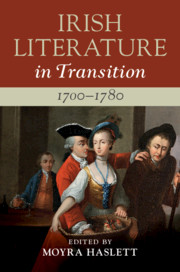Book contents
- Irish Literature in Transition, 1700–1780
- Irish Literature in Transition
- Irish Literature in Transition, 1700–1780
- Copyright page
- Contents
- Illustrations
- Contributors
- Series Preface
- General Acknowledgements
- Introduction
- Part I Starting Points
- Chapter 1 Starting Points and Moving Targets: Transition and the Early Modern
- Chapter 2 ‘We Irish’: Writing and National Identity from Berkeley to Burke
- Chapter 3 Re-Viewing Swift
- Part II Philosophical and Political Frameworks
- Part III Local, National, and Transnational Contexts
- Part IV Gender and Sexuality
- Part V Transcultural Contexts
- Part VI Retrospective Readings
- Index
Chapter 3 - Re-Viewing Swift
from Part I - Starting Points
Published online by Cambridge University Press: 28 February 2020
- Irish Literature in Transition, 1700–1780
- Irish Literature in Transition
- Irish Literature in Transition, 1700–1780
- Copyright page
- Contents
- Illustrations
- Contributors
- Series Preface
- General Acknowledgements
- Introduction
- Part I Starting Points
- Chapter 1 Starting Points and Moving Targets: Transition and the Early Modern
- Chapter 2 ‘We Irish’: Writing and National Identity from Berkeley to Burke
- Chapter 3 Re-Viewing Swift
- Part II Philosophical and Political Frameworks
- Part III Local, National, and Transnational Contexts
- Part IV Gender and Sexuality
- Part V Transcultural Contexts
- Part VI Retrospective Readings
- Index
Summary
Recent levels of scholarly activity suggest that Jonathan Swift and Edmund Burke remain the pre-eminent Irish writers of the period 1700–1780. Swift’s works are currently being newly edited under the auspices of Cambridge University Press and a new edition of his Correspondence was completed in 2014. It is timely, therefore, to take stock of how these and other bibliographical and critical resources have altered our approach to Swift. The present chapter conducts this assessment, first by looking at the kind of normative critical approach with which the author was himself furnished when encountering Swift as a student; and subsequently by surveying the areas of biography, Irish studies, and book history in which research activity since 2010 has been intense. The chapter discusses recent critical approaches to Swift, identifying the paradigms which studies of this highly controversial writer create and challenge, asking what it means to read Swift in the twenty-first century.
- Type
- Chapter
- Information
- Irish Literature in Transition, 1700–1780 , pp. 68 - 88Publisher: Cambridge University PressPrint publication year: 2020

